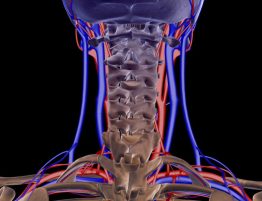
From the time they reach reproductive age, women are encouraged to visit an OB-GYN at least once a year for a wellness exam that may include screening for breast or cervical cancer, sexually transmitted diseases or other issues involving their reproductive organs.
But a growing body of research suggests there’s another organ they should be discussing: the heart.
“Cardiovascular risk assessment is important at all ages, particularly during the childbearing years,” said cardiologist Dr. Afshan Hameed, a professor of maternal and fetal medicine at the University of California, Irvine. “But I don’t think awareness is where it needs to be. We need to be bringing it up to every woman who comes in for OB-GYN care.”
Cardiovascular disease is the No. 1 cause of death in women and a leading cause of pregnancy-related deaths. Many of these deaths could be prevented if a woman’s cardiovascular risk was discussed more routinely, but especially before, during and after pregnancy, said Mary Canobbio, a clinical nurse specialist in the adult congenital heart program at the University of California, Los Angeles, School of Nursing.
“The average woman contemplating pregnancy does not think her heart is going to be a problem,” she said.
Here are five questions women should ask their OB-GYNs about heart health:
Can birth control affect my heart?
While there are many types of birth control, the most commonly prescribed is the oral contraceptive pill. There are three types of pills, all of which involve hormones – either a combination of estrogen and progesterone or progesterone alone.
But oral contraceptives with estrogen have been shown to increase the risk for blood clots, strokes and heart attacks.
Women who have a history of high blood pressure or who have had blood clots are discouraged from taking estrogen, Canobbio said. “Their gynecologist needs to screen them to see which types of birth control are best suited for them. There are alternatives to hormone-based contraception.”
How can pregnancy affect my heart, and what should I do to prevent complications?
Ideally, women should optimize their health before becoming pregnant to prevent complications for themselves and their unborn child, Canobbio and Hameed said. That means maintaining a healthy weight, staying physically active, eating a healthy diet, getting blood pressure under control if it’s high and making sure blood glucose levels are within the normal range.
“Most women don’t think about their heart as they think about pregnancy, but women who have risk factors – such as obesity, high blood pressure or diabetes – should be concerned and talk to their doctor before they get pregnant,” Canobbio said. “These women are at higher risk for problems in their pregnancies.”
Obesity, for example, can lead to hypertension, or high blood pressure. Many women may not know they have it, she said.
“It depends on how often they see their primary care doctor or OB-GYN before they get pregnant,” Canobbio said. “They may not go because they do not think they are sick. We need to work with these women prior to conception to help them lose weight and get blood pressure under control. They may be prediabetic and not know it. These are all risk factors that women going into pregnancy may not know they have.”
Having excess weight or obesity increases the risk for gestational diabetes and preeclampsia, a high blood pressure disorder that can harm mother and child. Preeclampsia can advance to eclampsia, which causes seizures. Obesity also raises the risk of having a baby with a heart defect.
Hameed said she has also seen women in her practice who were born with heart defects but did not mention it because they hadn’t had any recent problems. Women born with heart defects have a higher risk of giving birth to a child with a heart defect.
Women “may have had heart defects repaired as a child and it never came up again. But this can become important as the patient gets older, particularly when they become pregnant,” Hameed said. “A cardiovascular risk assessment should be done at every single pregnancy and during the postpartum period.”
Canobbio said that’s true for every woman – not just those with risk factors or underlying disease.
“Even though women feel healthy, they need to be aware that today we are more concerned about women’s hearts prior to getting pregnant,” she said.
Women who have risk factors or underlying cardiovascular disease should discuss the potential effects on their pregnancy with their health care team, Hameed said. This includes foods or activities to avoid, how medications may affect their unborn child, what tests they may need to take and any other questions they may have.
If the mother is at high risk, Hameed said, she should also make sure the hospital where she plans to deliver is equipped to handle any complications that may arise during childbirth.
What symptoms during and after pregnancy might be related to my heart?
There are symptoms a woman may experience during and even after pregnancy that could signal cardiovascular trouble, Hameed said. For example, shortness of breath and exhaustion might be overlooked if the woman assumes she’s just worn out from the pregnancy, but they could be symptoms of peripartum cardiomyopathy, an uncommon type of heart failure that occurs toward the end of a pregnancy or in the months that follow.
It can happen to women with no prior diagnosis of heart disease, and because it mimics some symptoms of pregnancy, women may not recognize it as something heart-related, Hameed said.
If I’ve had pregnancy complications, does this affect my long-term heart health?
Pregnancy complications, also referred to as adverse pregnancy outcomes, include gestational hypertension, preeclampsia, gestational diabetes and babies that are born too soon or too small. Research suggests that women who have had adverse pregnancy outcomes are at greater risk for cardiovascular disease than those who have not.
“Pregnancy is a stress test for the cardiovascular system,” Hameed said. Women who develop adverse pregnancy outcomes or blood pressure-related issues during pregnancy “have already gained one risk factor for cardiovascular disease in the future.”
A 2021 American Heart Association scientific statement summarized evidence linking pregnancy complications to future maternal cardiovascular disease risks. Up to 15% of pregnant women in the U.S. experience such complications.
“The heart has to work extra hard during pregnancy to support both mother and child,” said Canobbio, a co-author of the report. Doing so may unearth weaknesses in the mother’s cardiovascular system that should be carefully monitored in the years that follow.
How can menopause affect my heart?
Estrogen is a natural hormone that provides women with some protection from heart disease. When estrogen levels drop during menopause, a woman’s risk for cardiovascular disease increases. This makes it another good time to speak with a doctor, who may order tests to identify risk factors that may need to be addressed, Canobbio said. It’s also important to look at family history.
“A lot of women don’t appreciate that the cardiovascular problems of their parents and grandparents that developed as they aged may become their problems,” she said. “If there is a history of heart disease or stroke or high blood pressure, then they should talk to their gynecologist or primary care physician to get an evaluation of where they stand.”
Menopause can also cause a lot of symptoms – such as hot flashes, night sweats and sleep disturbances – that are treatable with hormone replacement therapy. Some studies suggest these therapies, taken early in menopause, may provide some cardiovascular benefits, help prevent Type 2 diabetes and protect against bone loss, according to a 2020 AHA report summarizing research in this area.
However, a 2023 study in the journal Hypertension found at least one form of hormone replacement therapy may increase blood pressure risks. And other studies have shown some types of hormone replacement therapy can increase the risk for blood clots in some women.
Canobbio said women should discuss their individual risks and potential benefits of hormone replacement therapy with their health care team, ideally early in menopause.
Regardless of the stage of life they’re in, women should ask their OB-GYNs and other members of their health care team about their heart health and what they can do to lower their risks, Hameed said.
“When we look at prevention, there are many steps we can take,” she said. “We have to look at all of a woman’s cardiovascular risk factors and help her modify them to prevent the onset of cardiovascular disease in the future.”








